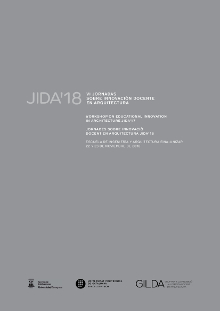Diseño e implementación de la pauta de seguimiento del logro formativo
DOI:
https://doi.org/10.5821/jida.2018.5466Resumen
Se presenta el diseño e implementación de la Pauta de Seguimiento del Logro Formativo. Esta es aplicada al finalizar los ciclos de formación y en el proceso de titulación de la carrera de arquitectura. Este instrumento fue diseñado por el equipo de profesores más un asesor curricular externo. Se construye sobre el cruce realizado entre los programas de asignatura de los Talleres de Diseño y la definición del perfil de egreso, tomando como base los desempeños esperados establecidos en la Mapa Curricular de la carrera. Esta pauta se constituye como un instrumento de evaluación y seguimiento que establece el estándar mínimo que debe lograr un titulado para cumplir con el Perfil de Egreso declarado. También, permite informar a los distintos actores (estudiantes, profesores y autoridades) respecto del avance de los estudiantes en su proceso formativo. En el año de implementación, este instrumento ha demostrado gran utilidad y pertinencia para la carrera.
Citas
Agencia nacional de evaluación de la calidad y acreditación (2013). GuÃa de apoyo para la redacción, puesta en práctica y evaluación de los resultados del aprendizaje. Edición ANECA. Madrid, España
Bologna Working Group. (2005) “A Framework for Qualifications of the European Higher Education Areaâ€. Bologna Working Group Report on Qualifications Frameworks (Copenhagen, Danish Ministry of Science, Technology and Innovation)
Contreras, G. (2010), “Diagnóstico de dificultades de la evaluación del aprendizaje en la universidad: un caso particular en Chile. Educación y Educadores†[en linea]: [Fecha de consulta: 13 de septiembre de 2017] Disponible en: http://www.redalyc.org/articulo.oa?id=83416998004> ISSN 0123-1294
European Association for Quality Assurance in Higher Education (2009). “Standards and
Guidelines for Quality Assurance in the European Higher Education Areaâ€. 3rd ed. Helsinki: ENQA. http://www.enqa.eu/wp-content/uploads/2013/06/ESG_3edition-2.pdf.
Fernández, M. (Sin año) “Bases para la elaboración del proyecto docente. Fundamentación Disciplinar. Universidad de Granada. [Fecha de consulta: 10 de septiembre de 2017] Disponible en http://calidad.ugr.es/pages/secretariados/form_apoyo_calidad/docs/materiales-iniciacion/proyecto-docente/documentos/fundamentaciondisciplinar
Flores, M., Veiga A., Barros, A., & Pereira, D. (2015) “Perceptions of effectiveness, fairness and feedback of assessment methods: a study in higher education, Studies in Higher Educationâ€, 40:9, 1523-1534, DOI: 10.1080/03075079.2014.881348
1080/02602938.2015.1055233
López, V. & Sicilia, A. (2017) “Formative and shared assessment in higher education. Lessons learned and challenges for the future, Assessment & Evaluation in Higher Educationâ€, 42:1, 77-97, DOI: 10.1080/02602938.2015.1083535
Medland, E. (2016) “Assessment in higher education: drivers, barriers and directions for change in the UK, Assessment & Evaluation in Higher Educationâ€, 41:1, 81-96, DOI: 10.1080/02602938.2014.982072
Miller, A., Imrie, B., & Cox, K. (1998). “Students assessment in higher education. A handbook for assessing performance†Editorial Routedge. New York City, Estados Unidos de Norteamérica. ISBN 0 7494 2797 3
Pereira, D., Flores, M., & Niklasson, L. (2016) “Assessment revisited: a review of research in Assessment & Evaluation in Higher Educationâ€, 41:7, 1008-1032, DOI:
VicerrectorÃa Académica, Dirección General de Pregrado (2016). “Orientaciones para la creación o modificación de un programa de asignatura por resultados de aprendizajeâ€. Ediciones Universidad San Sebastián. Santiago, Chile.
VicerrectorÃa Académica, Dirección General de Pregrado (2015-1). “Orientaciones para el desarrollo de la docenciaâ€. Ediciones Universidad San Sebastián. Santiago, Chile.
VicerrectorÃa Académica, Dirección General de Pregrado (2015-2). “Orientaciones al proceso de evaluación para el aprendizajeâ€. Ediciones Universidad San Sebastián. Santiago, Chile.
Zabalza, M.A. (2012). “Articulación y rediseño curricular: el eterno desafÃo institucional. Revista de Docencia Universitariaâ€. REDU.Vol.10 (3) Octubreâ€Diciembre. Pp. 17â€48 Recuperado el (03-03-2018) en http://www.redâ€u.net/



















